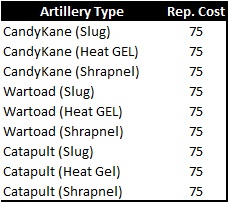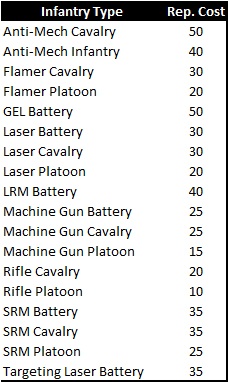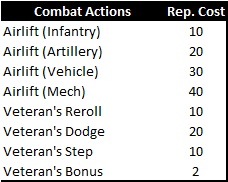Reputation
Reputation is a new concept developed by our group. Experience is what you gain by finishing a mission. Reputation is what you gain from going far beyond what you were expected to do. As a game mechanic, Reputation is sort of like currency; it can be used to purchase things, or for a in-game statistical value. As a Role-Play mechanic, it justifies this campaign not using currency, and gives players a reason to go that extra mile – and maybe take a bit more risk – for the possibility of more rewards. Every scenario will have specific reputation rewards, which are described before the scenario starts.
A question that we faced when designing Reputation was “How can you lose Reputation if you keep winning scenarios?” The answer, from a Role-Play perspective, is very simple. True Warriors don’t need support units (such as Infantry) to destroy their enemies. If you are buying a support unit, or getting evacuated in the middle of combat, your fans will think less of you, and your reputation will decrease. Of course, if you have a support unit, you will most likely earn Reputation even faster (assuming you do not let your support unit get killed).
At the moment, Reputation allows you to purchase support units, including Infantry and Artillery; and special combat actions, such as Airlifts. Below is a list of some of the things currently available for purchase with Reputation. It should be noted that most Reputation items are perishable – while Infantry will regenerate their numbers between combat, if you allow your unit to be totally destroyed, it is gone forever.
 You can find stats to both Artillery and Infantry on their respective pages. You can find stats to both Artillery and Infantry on their respective pages. |
 |
Combat Purchases
 These can be made at any point during combat, but have their own special rules. Combat purchases can be split between whomever is at the table; if a Mech needs to be Airlifted, multiple players may split the difference if they want to help out their companion, as an example. Rerolls purchased with reputation can only be done once per attack; you must take the second roll, even if it is not to your liking (or worse than the initial roll).
These can be made at any point during combat, but have their own special rules. Combat purchases can be split between whomever is at the table; if a Mech needs to be Airlifted, multiple players may split the difference if they want to help out their companion, as an example. Rerolls purchased with reputation can only be done once per attack; you must take the second roll, even if it is not to your liking (or worse than the initial roll).
- Airlift: You must declare this and spend Reputation during your attack phase. On the next Movement Phase, the target is removed from the battlefield by paid recovery teams. If you purchase an Airlift but the target does not survive until the next Movement Phase, the points are still spent. Once the target has been Airlifted, it is out of the game for that scenario; if it is a player, they will still receive full Reputation with their group.
- Veteran’s Reroll allows you to reroll any D20 you or an ally just made and disliked the result of. You must take the second roll, and cannot make an additional roll. If you have a reroll ability, you can use this ability with it, but cannot reroll past this for any reason.
- Veteran’s Dodge forces an opponent to reroll one D20 rolled against you or an ally. This can only be used once on any die, and it still allows the other roll to apply (for example, a “Natural 20” on the location “Natural 20” (A Critical Hit on the Head) would force the attacker to reroll either the attack die, or the location die, but not both. You and your allies could pay 40 to reroll both dice, however, as each is a different D20.
- Veteran’s Step allows you to increase your Walking and Running Speeds by 1 for one Movement Phase. This ends as soon as the extra step is taken. If your speed is 4/6, it would increase to 5/7, as an example. Jump Speed is unaffected by this. You cannot use this bonus more than once per movement phase.
- Veteran’s Bonus gives you a +1 bonus to a Piloting or Gunnery check before it is rolled. You can spend as many points on this as you want on any given die roll; if the total goes over 20, it does not count as a critical (only Natural 20’s count). You cannot use this on a Location roll.